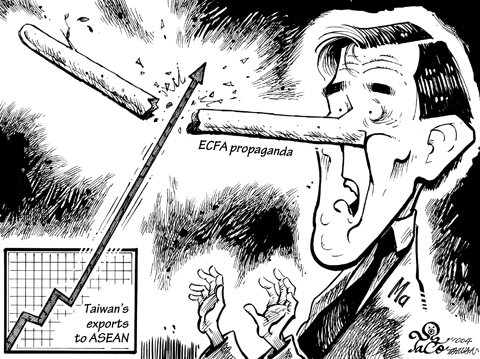|
Ma rejects ECFA job-loss claim
IGNORING LABOR: As the president met labor
representatives, one complained that he avoided workers since being elected.
Reporters were asked to leave as he talked
By Ko Shu-ling
STAFF REPORTER
Tuesday, Apr 13, 2010, Page 1

President Ma Ying-jeou, right, yesterday
shakes hands with representatives from local labor groups at the Presidential
Office, where he promised to protect Taiwanese workers’ rights after signing an
economic cooperation framework agreement with China.
PHOTO: CNA
President Ma Ying-jeou (馬英九) yesterday dismissed claims that signing an economic
cooperation framework agreement (ECFA) with China would cause 3 million workers
to lose their jobs.
“Recently, you must have heard somebody spread the terrifying rumors about how 3
million workers would lose their jobs once an ECFA is signed,” he said. “It’s
total nonsense.”
Although Ma did not name names, Presidential Office Spokesman Lo Chih-chiang
(羅智強) said that Ma was likely referring to the Democratic Progressive Party’s (DPP)
claim on April 5 that the planned accord would deal a blow to the country’s 3.21
million white-collar workers in the service industry.
The Taiwan Thinktank also said on Saturday that the jobs of 5.92 million
Taiwanese workers would be threatened by an ECFA. They included 3.21 million in
the service sector, 1.89 million in traditional industries and 820,000 in
electronics and petrochemicals.
Ma yesterday said that once a trade pact is signed, Taiwanese products would be
more competitive because of lower tariffs, adding that the job market would
improve. Lower or zero tariffs, Ma said, would attract more foreign investors to
Taiwan, making it a trade hub for the Asia-Pacific region.
“I guarantee you the government’s priority is to take care of laborers, small
and medium-sized enterprises and weaker traditional industries,” he said.
Ma made the remarks while addressing labor representatives at the Presidential
Office yesterday morning.
Taiwan Thinktank executive director Cheng Li-chiun (鄭麗君) said on Saturday that
while the government had reiterated it would not allow more Chinese workers to
enter the local market, the government has amended certain laws and regulations
to let them in under the categories of investment, business activities,
international enterprises and professional technicians.
Ma yesterday said that an ECFA would not address the labor issue and that the
proposed pact was an “economic connection between countries and countries or
trade entities and trade entities” that would have the least impact on the
economy of the signing parties.
“Its unique feature is it is small in scale, but necessary,” he said. “It is
sort of like a free-trade agreement [FTA], but not quite as comprehensive or
time-consuming.”
Ma said the administration would “take one thing at a time” after the deal is
signed because it is a framework agreement.
“What we want to do is to prolong the time, reduce the impact and let the
businesses affected by it have more time to adjust,” he said.
During the second round of negotiations in Taoyuan two weeks ago, Ma said China
agreed to “do its best” not to let Taiwanese businesses that are already
suffering take an additional hit once an ECFA is signed.
The negotiation team would try not to include such traditional industries as
towels, bedding, textiles, tiles and shoes in the “early harvest” list, but if
this proved unsuccessful, they would try to get more time for them to adjust, he
said.
To help “a few” traditional industries that would be affected by the proposed
accord, Ma said the administration would earmark NT$95 billion (US$2.9 billion)
over 10 years. As for agriculture, Ma said China also agreed not to include any
agricultural products in the “early harvest” list.
At the same setting yesterday, a labor representative urged Ma to spend more
time listening to labor groups rather than developing closer relationships with
huge consortiums.
“It was easy to see you before the [presidential] election, but it is so hard
since you were elected,” he said. “Your talk just now simply wasted much of our
precious time.”
The man said that he had hoped Ma could do something for workers after taking
office, but Ma should listen to them more if he really meant what he said.
While he was venting his grievances, reporters were asked to leave. The DPP
reacted angrily to the government’s claims that the party has exaggerated the
potential negative effects of the trade pact.
“The government needs to check its facts,” said Liu Chien-sin (劉建忻), an official
at the DPP’s policy research committee and a drafter of the report.
Ma
“The original report we released said that 3.2 million service industry jobs
would be ‘affected’ by an ECFA, not that they would lose their jobs,” Liu said.
Meanwhile, a survey by the Research, Development and Evaluation Commission (RDEC)
showed that 68 percent of respondents supported President Ma Ying-jeou (馬英九)
attending a series of hearings nationwide to explain an ECFA.
RDEC Deputy Minister Sung Yu-hsieh (宋餘俠) said the survey did not include any
questions regarding the public’s opinions on an ECFA itself, adding that the
Mainland Affairs Council and Ministry of Economic Affairs, the two agencies in
charge of the subject, would conduct such polls.
The survey, released yesterday, was conducted on March 8 and March 9.
The latest survey on an ECFA conducted by the commission, the agency in charge
of gauging public opinion on major policies, was in March last year. It showed
48 percent of respondents considered an ECFA beneficial to Taiwan’s future while
26.3 percent disagreed. About one quarter did not express an opinion.
Premier Wu Den-yih (吳敦義) has set the goal of 60 percent public support as a
requirement to sign an ECFA.
|
![]()
![]()
![]()